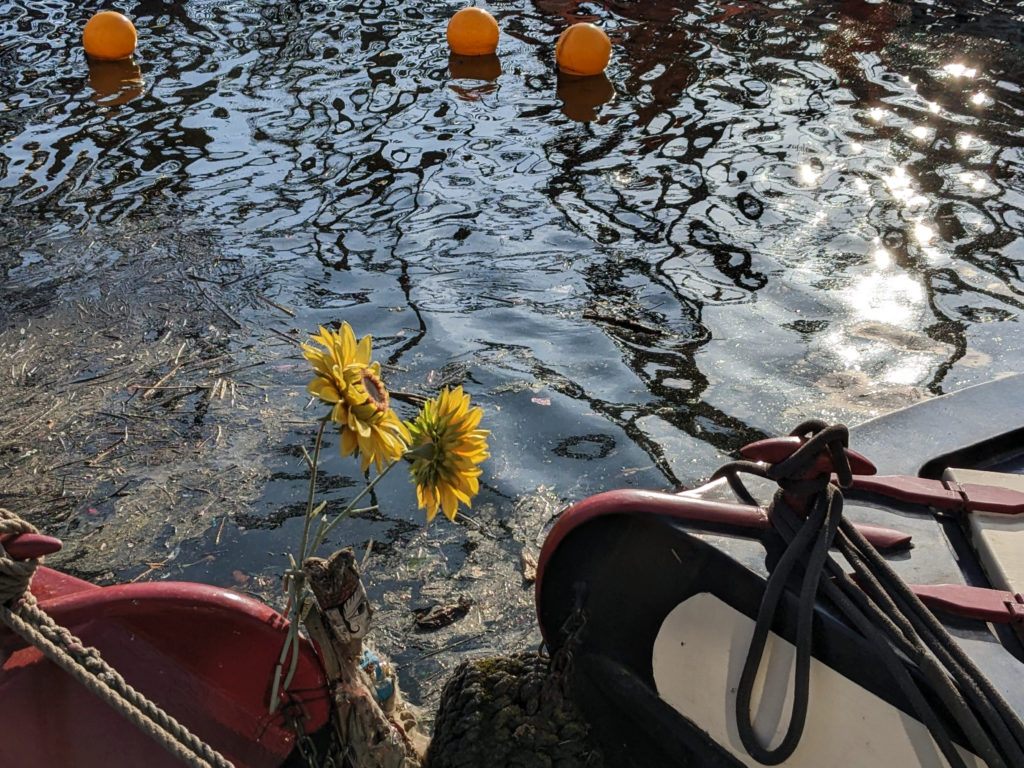Even the most caring friends can struggle to know what to say or do to support someone who’s grieving. In this piece, Stephanie Nicola-Miller reflects on what would have helped her after the loss of her dad.
When you find yourself plummeting into the depths of grief, the questions “what can I do?” and “is there anything you need?” can feel impossible to answer. Where do you begin?
Since losing my dad in March 2020, I have reflected extensively on those initial few weeks, and on the things I either could or should have asked for from those around me. Many of these were things I didn’t know would have helped me at the time, so I didn’t consider asking for them.
I’ve compiled these reflective thoughts below. I’d like to caveat this article by saying that I didn’t think to do any of these things for my bereaved friends before I myself had experienced grief. I wish I had had a guide – hopefully this can be yours.
Grief Gift List
Food
- Drop them over healthy food which can be frozen and eaten another day. You could say ‘I’m dropping this over, I can pop in to spend some time with you if you like or just leave it outside the door’.
- Gift cards for a supermarket shop or food delivery. Or you could even put an order in for them, but consult them on it first.
- Little treats, if that’s their thing.
Your Ears
- Don’t say: “I’m here if you want to talk”. It really puts too much pressure on the griever to be the person reaching out, particularly if they’re someone who finds it difficult to ask for help.
- I’d instead recommend asking questions, or being honest if you don’t know what to say, or use the ‘checking in approach’.
- “How are things today?”
- “How has it been recently?”
- Grief is such a bizarre journey. It twists and turns in a totally unpredictable manner, so don’t assume it’ll be the ‘same old’ for your grieving friend, and that once you’ve asked once, you don’t need to again.
Tea/coffee*
*Include decaffeinated! Remember that caffeine increases anxiety and inhibits sleep, which is one of our most important sources of healing.
For me, grief felt like a brain injury. Although it may sound dramatic, I really believe it helps to think of it in this way. It reminded me that I had to do the things that would give me the best chance of recovery e.g. sleeping properly, rather than sticking a band aid on and pretending everything’s fine, or exhausting myself further by trying to ‘crack on’ with life.

Flowers
- Can be nice, but bear in mind the griever will probably receive a few bunches in the first week. They might not have enough vases for them all (additional stress) and all of the flowers will start dying at the same time.
- I personally found it a bit strange to suddenly have a house full of flowers since I didn’t beforehand, so it almost served as a reminder of my grief when I saw them.
- I also repeatedly received the exact same bunch from a particular florist delivery service, which felt weird. It was like the ‘grief checkbox’ had been checked on a formulaic website, and my experience felt a little typecast. I know that that was absolutely not the intention of those who had sent them. Go for the personal approach if you can – buy them locally and deliver them yourself.
- Don’t feel like you have to follow tradition here. You could also buy dried flowers in a vase or low-maintenance plants. You could wait a couple of weeks before sending your flowers to steady the flow of gifts, with a thoughtful note to explain why you waited. (Definitely don’t wait before making any other contact, though).
Grief Books
Even if they don’t read, or they usually only read fiction.
I cannot emphasise enough how important it is to engage with grief. ‘Knowledge is power’, etc. Or, in this case, knowledge helps to prevent grief from overpowering you. Knowledge allows you to live alongside grief.
For me, books were a lifesaver in grief. I felt seen, heard, comforted and safe. I curled up in bed and read non-stop about the new world I was hurtling through, whilst the world around me shut down in response to the pandemic. At times, books felt like my only comfort.
Some titles that really helped me included –
- Bearing the Unbearable – Joanne Cacciatore
I read this within my first week of grieving and strongly believe that it helped steer me through it. I was reminded to accept my emotions, observe them, document them – even the ‘ugly’ ones (relief, anger, jealousy). I was reminded to not race ahead to ‘acceptance’, not to avoid my feelings or distract myself. Don’t get me wrong – confronting grief head-on in this way meant I had some utterly horrendous times, but they were always going to happen sooner or later anyway. What you hide from will always find you, one way or another. - The Body Keeps The Score – Bessel van der Kolk
An incredible book on trauma & the body. I would recommend this book to absolutely everyone, not just grievers. Same for Bearing the Unbearable, actually, because it will help you understand what your friend is going through. - Finding Meaning – David Kessler
I read this several years into grief. It’s a brilliant book which emphasises the benefits of having a determination to move through (rather than ‘get over’) grief in a healthy way. However, it can be difficult to face grief head-on when there are so many options for numbing and distraction out there. This could be a tricky one to read in grief’s immediate aftermath, so I would tread carefully here and go with your gut based on the person who’s grieving. It could make a good death anniversary gift for someone instead. - Letters from the Grief Club – Let’s Talk About Loss
Over 50 young grievers from Let’s Talk About Loss contributed to this book, and it is full of relatable experiences of grief which will hopefully help someone understand their grief a bit better.
A journal or notebook
The vast psychological benefits of journaling have been well-documented. My diary was a life- saver for me in those first few months. It also helped to read back through when I was experiencing a grief wave further down the line – it may sound counter-intuitive, but re-visiting those intense emotions helped me to bring everything up, have a huge cry, write some more, and then eventually settle down and sleep. The next day would usually be better.
0% booze
Please don’t encourage friends to drink while they’re grieving. They might want to, and that’s ok. You can be their companion if you both really want that. But encouraging self-destructive behaviour is not helpful.
Candles
You can never have too many. Just be careful with sickly smells. Patchouli is a nice one.
Blankets
If they don’t have these already, a lovely blanket can be really comforting during grief. Same with things like cushions, pillows, etc.

Trips in nature
Book the train for them or drive them out there. Get out for a long walk somewhere quiet and immersive, and don’t feel the need to talk constantly. Just be together.
Things you can do
Offer to go to the funeral
If you don’t want to, try to unpick that. In the meantime… offer to go to the funeral. There’s a reasonable chance your friend will say no, but they will deeply appreciate your offer.
Educate yourself
Read about grief or look up ‘good’ depictions of grief in TV & film.
– Whilst acknowledging that you will never ‘get it’ until it happens to you
– Whilst acknowledging that even if it has happened to you, their grief will feel different.
– Whilst acknowledging that even if it has happened to them before, their grief will feel different this time. You can ask them about that, too.
Ask about the Will
Wait a while before asking about this one. Talking about ‘death business’ right after death can feel inappropriate.
I found the business of my Dad’s will to be a hugely traumatic ordeal, and I know this to be common. Once the ‘dust has settled’, your friend will probably really appreciate support, questions and help here.
You could ask:
“Who is handling the will?”
Or even offer to sort through emails related to the Will if it’s too much for them.
Ask about the estate
Will a house need to be sorted through and emptied? Who is going to do that? Can you help – by being there, by moving things, or by helping to find someone to hire for it?
What else can I give them? Do I have to just buy stuff? Isn’t that a bit materialistic?
Your understanding ear.
Just let grief be what it is.
Example:
“[the funeral] must have at least been a day full of happy memories at least?”
me, in my head: “no, it wasn’t. It was the worst day of my life. Now I feel bad that I haven’t been able to put a positive spin on this day. Now I feel even worse. Am I a bad daughter?”
What I actually said: “uh, I guess so.”
Avoid leading questions or those that assume a certain experience. Instead, be open.
Don’t be scared to just ask: “How was the funeral?”
or “how are you feeling about things, now that the funeral has happened?”
Quite often, grieving seems to really ‘kick in’ after the funeral, since the first few weeks are spent in a state of total shock.

Encourage therapy
This can be found in
– psychotherapy
– writing and journalling
– art
– grief support groups (such as Let’s Talk About Loss)
– exercise
What do I do with them? We usually just go to the pub.
Just sit, just be. Embrace the silence.
Read together.
Go for a walk.
Go to a board game cafe.
Go to an art class or workshop.
Exercise together.
Go to a gig (seated, and with the option of leaving quickly if it’s needed).
Whenever you feel a wave of love for them, write it down and send it to them. Either in a card, a note or a message.
Remind them to harvest all of the love they wish they could pour onto their loved one and use it on themselves. “Grief is love with nowhere to go”
Stephanie Nicola-Miller
Have you been inspired by Stephanie’s blog? Find a meet up here or submit your own blog by emailing blog@letstalkaboutloss.org.

